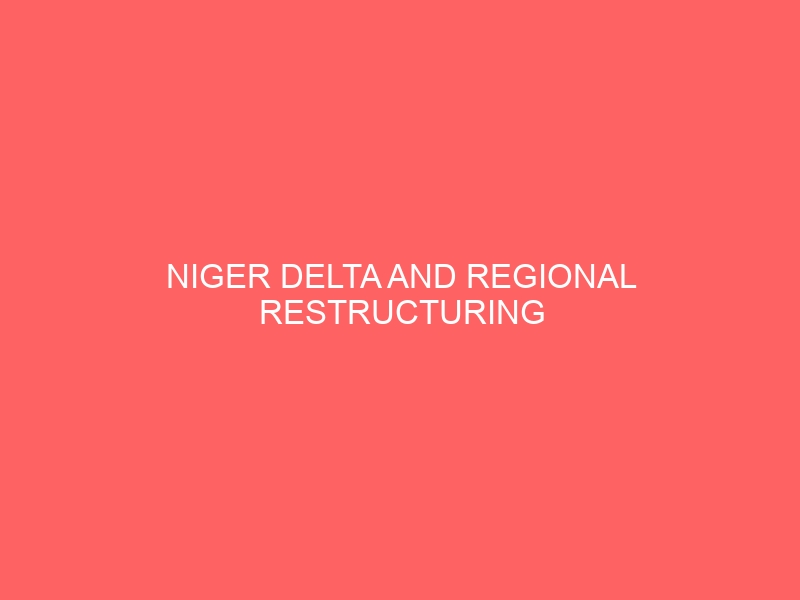It is not an absurd policy to make a proper preparatory selection of condiments required for a soup before setting the pot on the burning coals for cooking to commence in earnest. In that way, no individual or group would have a justification for any failure to execute a given responsibility. It becomes a collective project in the long run as everyone comes to the negotiation table with a position reached decisively and with authority and consent from his or her ethnic constituency to midwife the delivery of a region.
Such an early participation will create the foundation that is necessary to decimate tendencies of fear influenced by feelings of likely intimidation from predatory tribes in the future. One high credit it holds is the ensemble spirit offered to include the whole human content of the region to consensually create a union. A unique commonality of purpose is anticipated under the proposed participatory arrangement – a scenario different from the circumstances surrounding the birth of Nigeria where the citizens were arbitrarily herded into an unwieldy union without their consent.
This leads us on the natural course to the necessity for internal restructuring which ought to be conducted along tribal lines. Underlying the idea of a region is the assumption that the proposed political entity possesses some kind of essential unity beyond the mere geographic expression, a unity that not only binds its fabrics together but also sets it apart from other parts of the country. Here, the question of ethnicity is bold in the picture because the Niger Delta region is a complex confluence of distinct tribal nations. Not necessarily counting the eggs before they are laid, a proposition for a constitutional reform to reflect this specific peculiarity cannot be a toy for tossing.
Apart from the element of power-devolution which is the pith and marrow of the current philosophy of restructuring, the reforms leading up to the actual delineations may have to find a way to reorganize the state structure with a view to giving the indigenous peoples greater self-determination. In this regard, over numerical, economic and political considerations, new states can best be formed on the basis of ancestral and linguistic affinities. A boundary definition to distinguish the legal members of the region from those who do not belong to it is also an imperative.
The first inquiry about territorial jurisdiction is the determination of whether or not the Niger Delta Region is that of the entire coastal space, encompassing parts of the defunct Eastern and Western Regions of Nigeria, and thereby including many people and groups who are demonstrably not littoral States. These are factors that are scarcely less pronounced in all other regions of the country. It is an issue that will be taken with greater importance when it is time for a new Constitution.
To further promote internal and external boundary restructuring, the current sub-regions of Western Niger Delta, Central Niger Delta and Eastern Niger Delta can be made to pass through the refining fire of the Constitution to attain a status permitted by law as independent sub-regions with legal authority to select premiers on the basis of rotation. In other words, the office of Premier or Governor -General, as the case may be, of the region will be rotational amongst the three sub-regions.
At the very base, the Local Government system will still be allowed to exist with a drive to innovate and advance the development and economy of the communities by leveraging their cultural institutions and economic philosophies. The local government structure, by the new order, would be empowered by law to function more efficiently with a new authority as an autonomous tier of government. Contrary to what obtains in the present quasi-Federal system, the envisaged allocation distribution chain will be an upward movement from the local community through the local government, state government, regional government, to the Centre.
An exercise of weeding out unnecessary attachments to the States of the South-South geopolitical zone, which by their cultural, political and geographic contiguity, are the core Niger Delta States, will help to strengthen the region and check crisis that may arise from boundary disputes. These are reforms that will assure a friction-less coexistence. An harmonious cohabitation that may engender an atmosphere of peace devoid of unnecessary suspicion and hostility.
Beyond the issue of inclusion and exclusion, there is a further question. Is the Niger Delta viable as a region to be self-dependent in a regime without petro-dollars? The answer is not farfetched. The peculiarities of the environment give the Niger Delta people the promise of better economic opportunities that would afford them the leverage to continue in prosperity for many more centuries.
Doubts and disputes cannot be found around the manifest wealth-creation prospects of the maritime industry, for instance. The Niger Delta region is endowed well enough with the right resources to be reckoned with as the most viable maritime destination of West and Central Africa. The region is strategically located by Providence to lead in the maritime sector.
This Niger Delta area is the second largest Delta in the world with a coastline of about 450 kilometers which is more than 50% of Nigeria’s 800 kilometers coastline. The region spans over 20,000 square kilometers out of which over 2,000 square kilometers constitute navigable inland waterways. Apart from 10 functional oil terminals, the region has an array of defunct, operational and proposed seaports that can be resuscitated, revitalized and regulated by an indigenous constitution to reflect the individual tribal States within the region.
On the premise of these statistics and from the foreseeable accompaniment of investment opportunities, a soothsayer is not needed to tell how the Niger Delta will grow to become the hub of this lucrative industry. This is a sustainable alternative source of revenue that has not been sufficiently tapped. In all modesty, a combination of the maritime and the agricultural sectors may contribute nothing less than an estimated sum of N9 trillion per annum to an approximately 32 million Niger Delta population.
With such a huge annual internally generated revenue, how will it be difficult to establish at least one world class Maritime University in each of the sub-regions to train and develop the needed human capacity for the industry? Special institutions for specific groups like those in the business of fish-farming or general agribusiness can be established to expose the people to new skills, modern technologies and current market demands.
Who says that agriculture cannot thrive within a landmass of several square kilometres in the midst of the largest mangrove swamp in Africa? It is on record that the ecosystem of the region contains one of the highest concentrations of biodiversity on the African planet. In addition to supporting abundant flora and fauna, it is an arable terrain that can sustain a wide variety of crops, lumber or agricultural trees, and more species of freshwater fish than any ecosystem in West Africa. The fishing industry is also lying fallow, apparently awaiting the expected Niger-Delta Region (NDR) to be birthed to fully harness the avalanche of potentials available in it.
The competence of these sectors as dependable diversification from the oil and gas industry demonstrates the potential viability of the region to survive for centuries without becoming economic liability to its neighbours.
Restructuring the present Nigeria is nothing if it is not an opportunity for each region to maximize its potentials. That is the reason the restructuring must be holistic to give the people the right to control the resources derived from their land.
Archbishop Anthony Okogie’s assertive summary of the nationwide clamour for restructuring as “a call to return the land and its wealth to the people” addresses itself to the main demand of the people of the Niger Delta. It carries in itself the core reason for the current agitation which is moving with destructive fire across the country.
Like the stream of other benefits, a restructuring would provide the impoverished Niger Delta indigenes with the opportunity to regain the right of ownership of their land. This ultimately means, the resources on it, below it and above it will legitimately and irrevocably belong to the several communities in the Niger Delta.
The Nigerian government does not have to trample this demand for restructuring, this call for a more prosperous nation under the feet of pride. Apart from the enormous economic benefits it holds up for national growth, regional autonomy is a strong foundation upon which democracy and sustainable development can thrive.
Fred Brisibe
Coordinator, Ijaw Human Rights Monitors.
ffumayei@gmail.com
Follow us on twitter @gbaramatuvoice
Copyright 2016 GbaramatVoice Newspaper. Permission to use quotations from this article is granted subject to appropriate credit being given to www.gbaramatuvoicenews.com as the source.












